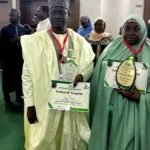
The Federal Capital Territory (FCT) Education Mandate Secretary, Dr. Danlami Hayyo, has reiterated the Secretariat’s commitment to supporting out-of-school children, particularly girls, across the territory.
Speaking at the Stand With A Girl Education Project (SWAGEP) Safe Space Girls’ Graduation and Award Ceremony, supported by the Emerging Markets Foundation (Empower), Hayyo stressed that every child needs attention, noting that girls are especially vulnerable.
Represented by the Director of Special Duties, Ramatu Ajuji Habu, he said:
“Every child needs attention. But why girls are given special focus is because they are more vulnerable; they are the weaker aspect.”
Habu highlighted the FCT Education Secretariat’s ongoing efforts to expand access to education, including the establishment of more primary and secondary schools at the ward level.
“We also have community-driven efforts, where if a community feels the need to establish a school, we step in to support them and allow such schools to operate within their community,” she explained.
She further discussed the Secretariat’s policies to curb child marriage and ensure that girls complete their basic education.
“By the time you finish junior secondary school and you have a skill in your hand, at least you can stand on your own,” she said.
ALSO READ: I’ve stabilised Rivers, achieved Tinubu’s mandate — Ibas
Habu expressed optimism that such initiatives would help nurture a new generation of empowered and educated individuals.
The Secretariat’s commitment to expanding access to education for all children—particularly vulnerable groups like girls and out-of-school children—remains central to the territory’s development goals. By working with NGOs and community leaders, the Secretariat aims to provide opportunities for children to acquire knowledge and skills that will enable them to live meaningful lives.
The Executive Director of Stand With A Girl Initiative (SWAG), Margaret Bolaji-Adegbola, also spoke on the organization’s work to empower girls in Internally Displaced Persons (IDP) camps through education and skills training.
“We’re very excited to be holding our graduation for the Stand With A Girl Education Project (SWAGEP),” Bolaji-Adegbola said. “For six months, we’ve worked with 60 girls from two IDP camps, carefully selected based on specific criteria.”
The girls participated in the Safe Space program, where they received mentorship, life skills training, sexual and reproductive health education, and vocational skills.
“They learned diverse skills—from life skills, sexual and reproductive health knowledge, and menstrual hygiene to understanding their bodies, assertiveness, communication, leadership, advocacy, and vocational training,” she explained.
The participants also engaged in advocacy, speaking to the National Commission for Refugees, Migrants, and IDPs, which resulted in the provision of chairs, bags, and other essential items for the camp’s primary school.
“These girls were on stage, not just talking about their problems but also presenting solutions,” Bolaji-Adegbola added.
She expressed gratitude to partners and mentors who supported the program, noting the remarkable transformation of the girls.
“I walked into the room today and I was amazed. From the first day when many looked unkempt and shy, today they were confident—looking us in the eye and saying, ‘Yes, I’ve learned this,’” she said.
Bolaji-Adegbola urged the government to prioritize quality and affordable education for girls.
“Government should make sure that education is not only of good quality but also safe and affordable for girls everywhere,” she emphasized.
She reaffirmed SWAG’s commitment to empowering girls to achieve their full potential, expressing hope that the government would support their efforts.
“Let’s continue until every girl returns to school and reaches her full potential,” she said.
One of the graduating students, 16-year-old Loveth Solomon from an IDP camp, shared her gratitude and excitement.
“The program is so nice. I learned many things—how to be kind, patient, and neat as a young girl like me,” she said.
Loveth explained that she had once been in school but dropped out due to financial challenges.
“I was in grade 3 when my dad said he didn’t have money to keep me in school anymore,” she recalled. She expressed her desire to continue her education and one day become an actress.
Despite her challenges, Loveth said she feels a responsibility to help others.
“I feel bad. I wish I had something so I could help them, but even I am not in school today,” she said. She encouraged other girls in her situation not to give up:
“Whatever you are doing, don’t give up. Keep pushing. Maybe one day, God will help you.”
Loveth’s story highlights the impact of initiatives like SWAGEP, which give girls in IDP camps access to education and skills training. Her determination and resilience are a source of inspiration, and her message of hope underscores the importance of investing in girls’ education.
WATCH TOP VIDEOS FROM NIGERIAN TRIBUNE TV
- Let’s Talk About SELF-AWARENESS
- Is Your Confidence Mistaken for Pride? Let’s talk about it
- Is Etiquette About Perfection…Or Just Not Being Rude?
- Top Psychologist Reveal 3 Signs You’re Struggling With Imposter Syndrome
- Do You Pick Up Work-Related Calls at Midnight or Never? Let’s Talk About Boundaries






